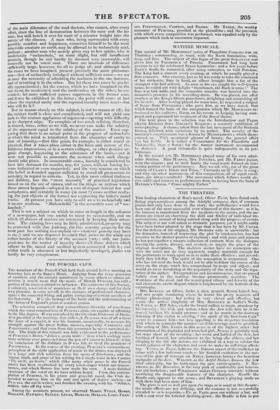MATINEE MUSICALE.
THE second of Mr. MosensmEs' series of Pianoforte Concerts was on Thursday ; commencing, as usual, with the BACH foundation, wide, deep, and firm. The subject of this fugue of the great SEBASTIAN was given him by FREDERICK of Prussia. FREDERICK had long been anxious to see the celebrated Saxon harmonist ; and a few years before BACH'S death, lie consented, after many entreaties, to visit Potsdam. The King had a concert every evening, at which he usually played a flute concerto. One evening, just as he was ready to take the command of his orchestra, flute in hand, an officer brought him a list of the strangers who had arrived. As soon as his eye caught the well-known name, he called out with delight "Gentlemen, old Bach is come !" The flute was laid aside, and the venerable maestro was hurried into the monarch's presence in his travelling-dress. He was placed, one after another, at the King's fifteen pianofortes, delighting and astonishing all his hearers. After having played for some time, he requested a subject of fugue from FREDERICK; who gave him, as we have stated, that which formed the basis of the composition which Mr. MOSCIIELES in- troduced to his auditors ; Baen, on his return to Leipsig, having com- posed and perpetuated his treatment of the Royal theme.
The next piece in the selection was the Introduction and Fugue (Kyrie Deism) from Moz.trer's Requiem ; a masterly exhibition of score-playing. A theme, taken from the last movement of the Sinfonia Esteem followed, with variations by its author. The novelty of the morning's entertainment was a Sonata by MExilmssonst; which disap- pointed us. With occasional gleams of beauty, the general effect was but feeble. It is rather a Concertante for the Pianoforte and Violoncello, than it Sonata for the former instrument accompanied by thelatter. A good violoncello is quite indispensable to its per- formance.
In the second act, Mr. MosenELEs played some of his own admi- rable Studios. Miss MAssoN, Mrs. TOULMIN, and Mr. PARRY junior, were the singers ; and in their hands the vocal music formed an inte- resting portion of the performance. May we ask why, out of the great variety of CLAN'S Duets and Trios, " Cantando un di" alone is sung; and why the other movements of this composition, all of equal excel- lence, are always omitted? The movement which follows would de- rive additional interest in performance from its having been the basis of HANDEL'S Chorus, " Come mighty Father."


























 Previous page
Previous page